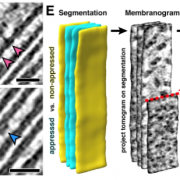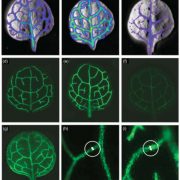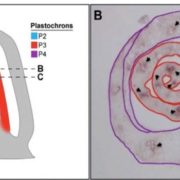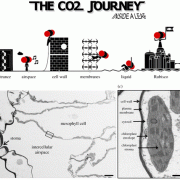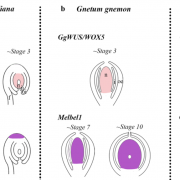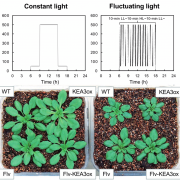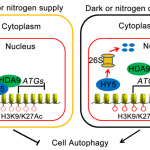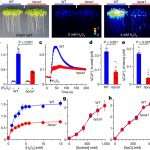Embryonic photosynthesis affects post-germination plant growth (Plant Physiol.)
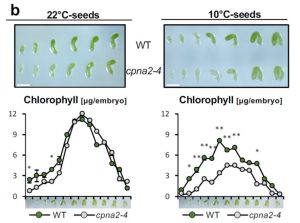 Angiosperm seeds develop within maternal tissues, yet in some species including Arabidopsis the developing embryos carry out photosynthesis. In Arabidopsis, this is transitory, and the embryonic chloroplasts lose chlorophyll and dedifferentiate into eoplasts as the seed matures. Sela et al. set out to investigate whether embryonic photosynthesis is beneficial to the post-germination plant. They identified a cold-induced mutation in a critical chloroplast-localized chaperone. At 10°C, embryos carrying this mutation delayed establishment of a functional photosynthetic apparatus, which allowed the authors to determine the significance of embryonic photosynthesis. The found that perturbing embryonic photosynthesis “leads to profound developmental defects starting from early post-embryonic seedling development and well into the vegetative phase of the plant.” However, as yet it is unclear exactly how this occurs; it appears to not be an affect of altered food stores. It is possible that in wild-type plants the eoplasts that form late in seed development somehow contribute to the plant’s later success, and perturbing this process causes the observed developmental defects. (Summary by Mary Williams) Plant Physiol. 10.1104/pp.20.00043
Angiosperm seeds develop within maternal tissues, yet in some species including Arabidopsis the developing embryos carry out photosynthesis. In Arabidopsis, this is transitory, and the embryonic chloroplasts lose chlorophyll and dedifferentiate into eoplasts as the seed matures. Sela et al. set out to investigate whether embryonic photosynthesis is beneficial to the post-germination plant. They identified a cold-induced mutation in a critical chloroplast-localized chaperone. At 10°C, embryos carrying this mutation delayed establishment of a functional photosynthetic apparatus, which allowed the authors to determine the significance of embryonic photosynthesis. The found that perturbing embryonic photosynthesis “leads to profound developmental defects starting from early post-embryonic seedling development and well into the vegetative phase of the plant.” However, as yet it is unclear exactly how this occurs; it appears to not be an affect of altered food stores. It is possible that in wild-type plants the eoplasts that form late in seed development somehow contribute to the plant’s later success, and perturbing this process causes the observed developmental defects. (Summary by Mary Williams) Plant Physiol. 10.1104/pp.20.00043
[altmetric doi=”10.1104/pp.20.00043″ details=”right” float=”right”]


